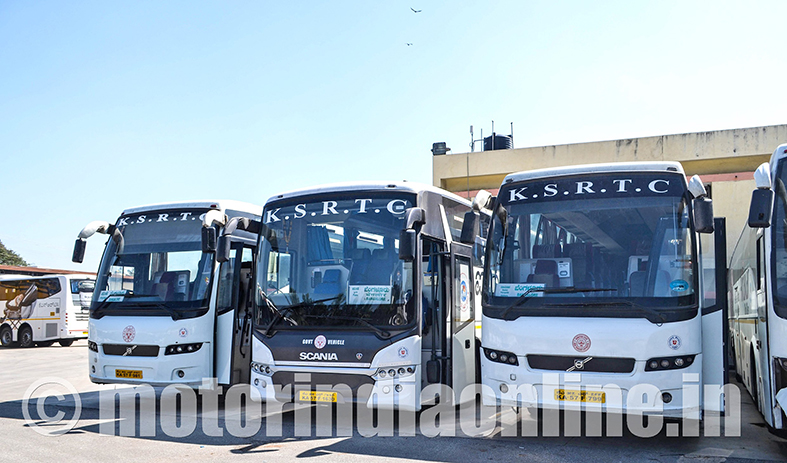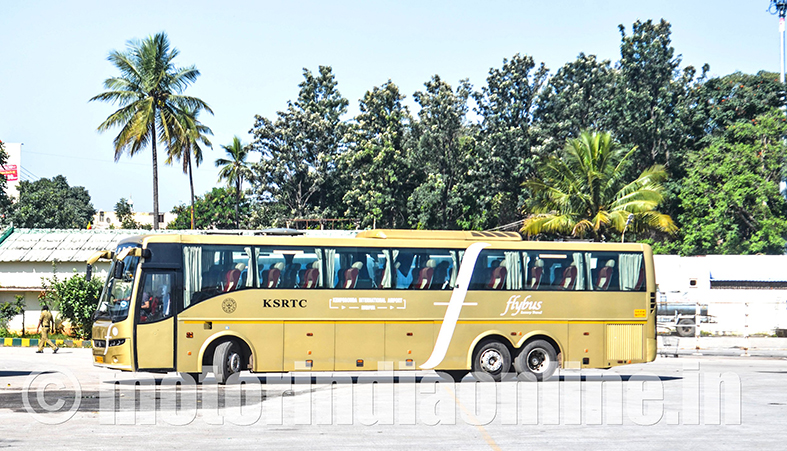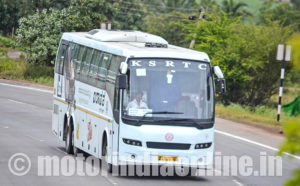The Karnataka State Road Transport Corporation (KSRTC), in the 56th year of its journey, emerges the best among all the State road transport undertakings in India. Over the years, KSRTC has initiated and succeeded in areas like use of information technology, transparent HR policies, environmental initiatives, etc. These initiatives were well recognized in many national and international forums, with an achievement of 209 Awards won by the STU till date, including the Information Technology Award National E-Governance 2016-17 Gold Award, Award of Excellence by Ministry of Urban Development, and the International Public Transport Award (UITP). We spoke to Mr. S.R. Umashankar, Managing Director, KSRTC, at the Corporation headquarters located at Shantinagar, in the heart of Bengaluru.

Mr. Umashankar observed: “Being ranked the topmost State road transport undertaking in India, KSRTC bears an important responsibility and commitment towards its commuters and the community. We, as a Corporation, believe that an efficient work culture and environment should be created and promoted, which helps the organization to run efficiently and effectively.”
Promoting sustainable bus services
Elaborating on KSRTC’s sustainable fleet services, the MD said: “KSRTC has a profound foundation of good maintenance infrastructure and dedicated workforce. Our buses have minimum breakdown ratio, and owing to our big fleet of buses, we have often been able to meet emergency situations for replacements within a very short span without affecting the travelling passenger. Our trained motivated crew are our biggest asset to carry on our streamline bus fleet operations, 24×7. I strongly believe that our dedicated approach towards public service has helped us earn the trust of the travelling passengers. This has increased the reliability factor of KSRTC buses on point-to-point travelling.”
He added: “Our constant, strive to maintain our fleet services with well-maintained buses, concentrating on time-to-time service upgrade, gives a new dimension to our operation front. As a new development to boost operations, KSRTC has started providing Wi-Fi services on board its buses under a public tender collaboration with KPIT. Currently the trial run is operational on 50 buses of the Corporation, including Express, Rajahamsa and Volvo buses. We have also introduced ‘Fast-Tag’ facility for E-toll purposes on our buses, with the IDBI Bank as the nodal agency, on a 3-year contract. Our workshops are undergoing an automation upgrade with the introduction of new automation instruments which will save time and energy, thereby increasing productivity. As a streamlining measure, we have also built waste-water treatment plants at our equipment depot.”
Well-equipped bus stations
KSRTC maintains well-equipped bus stations with modern infrastructural facilities. The modern hi-tech bus stations had all transport facilities and utilities under one roof, with well-laid seating arrangements, reservation counters, digital display, an intelligent transport system, public addressing system, tourist information kiosks, crew restrooms, cloak rooms, drinking water and canteen facilities, commercial establishments and offices, modern toilets, two-wheeler and four-wheeler parking facilities, ATM centres and prepaid-taxi and auto-rickshaw hubs. Free Wi-Fi facilities have also been introduced in some bus stations.
Mr. Umashankar further said: “We are planning to provide public mineral water drinking facilities in our bus stands at a very economical rate of a rupee per litre. The water will be purified by reverse osmosis, and will be available through the means of a coin vending machine. Catering to the need of pure drinking water for the general public, we are in a venture with BPCL for its instalment in around 15 bus stations of our five operational divisions, in the State, as an initiative. We have also requested the local legislators to help us upgrade the bus stands in their working area with such amenities.”
Bus crews form an integral part of the KSRTC fleet services. The driver selection process in KSRTC is purely through merit, which includes a competitive exam. The Corporation has four driving schools at Bengaluru, with two more to be added soon. The STU has a total of eight driving schools across the State. The selected drivers undergo an induction training of one month in the driving schools, while the mechanics undergo 3-month initial training before joining the Corporation.
KSRTC conducts refresher training courses once every five years for its bus crews and mechanics on the latest technology and advancements in the industry. Special yoga camps, motivational camps and concentration camps are being conducted at regular intervals to keep the staff motivated.
Speaking of KSRTC’s initiatives to address passenger queries and complaints, the MD stated: “We have a dedicated ‘Avatar’ team which keeps a track of the social media interactions, feedbacks, suggestions and complaints. Our KSRTC website has a daily traffic of around 40,000 people on an average and all customer enquiries are being addressed and followed up seriously with priority.”
Stressing the importance of ‘Smart-Ticketing’ as a measure to enhance KSRTC’s sustainable approach and footprint regarding future technology, the MD said: “KSRTC is one of the first STUs in India to use ‘Electronic Ticketing Machines’ on board its buses in 2005. We are introducing GPRS-enabled handheld machines soon, which will be compatible for Smart-Card use in future. We intend to start the smart-ticketing initiatives with Smart-Passes, which will be upgraded with prepaid Smart-Cards in the near future.”
Expansion initiatives with well-maintained fleet
KSRTC has a modern bus fleet, consisting of Ashok Leyland, Tata, Eicher, Volvo, Scania and Mercedes-Benz vehicles constituting a mammoth total of around 8,489 buses serving 27.28 lakh passengers daily and covering 28.46 lakh km per day on 7,898 of its daily schedules. Connecting people and places within Karnataka and the neighbouring States like Maharashtra, Andhra Pradesh, Telangana, Tamil Nadu, Kerala and Goa, including the Union Territory of Puducherry, KSRTC is now focussing on extending its services to Gujarat covering cities of Surat and Ahmedabad. It operates daily services to major destinations like Mumbai, Pune, Shirdi, Ernakulam, Trivandrum, Tiruchi, Hyderabad, Vizag, Chennai, Coimbatore, Ooty, Tirupati, Vijayawada, Cochin, Madurai, Kozikhode and many more.
As a major development, KSRTC, in its venture with Volvo Buses India has gone for a major deal for purchase of around 121 Volvo B11R I-Shift multiaxle coaches on 13.8 mtr (47 semi sleeper seats) and 14.5 mtr (51 semi sleeper seats) length, with better legroom facility for passengers travelling on long-distance routes. KSRTC is also stated to include 21 Volvo sleeper coaches in its fleet by March 2018, for long distance comfort and luxurious travelling experience.
Improving the airport connectivity through its Volvo multiaxle – ‘FlyBus’ service – the Corporation now plans to include 7 new buses in the fleet by the end of October 2017. With future expansion strategy, KSRTC has gone for a deal of Rs. 650 crores with Ashok Leyland for procuring 1,700 buses, covering its intra-State operations. Adding a new start-up in its fleet services, KSRTC has also started package tour services from Bengaluru to Tirupati in association with APTDC.
Terming the corporate and streamline administration of the Corporation as USP of KSRTC, Mr. Umashankar observed: “We have a well-motivated workforce following a strategic protocol whether it is our official administration or our fleet services. We take passenger safety on priority. We have reserved seats for ladies in our city bus services under BMTC, while we take care of the lady passengers in our long-distance buses too, for a hassle-free and secured ride.”
Integrated mobility
KSRTC promotes ‘Integrated-Mobility’ through its fleet services as a part of ‘Smart-Mobility’ initiatives. In 2013, it introduced the ‘FlyBus’ concept of connecting Bengaluru International Airport (Kempegowda Airport) with Mysore and later it connected Kundapur via Mangalore with another service.
Equipped with chemical toilet, pantry facilities, live-TV and on-screen real time flight schedule information updates, KSRTC Volvo B9R Multiaxle – ‘FlyBus’ coaches helped people travelling to BIAL Airport. With a service expansion project, KSRTC now plans to expand FlyBus Services to cities like Coimbatore, Tirupati, Madikeri and Calicut from BIAL in near future. Similar FlyBus services will be also started from Mangalore Airport to Bhatkal and surrounding regions.
Expressing his views on ‘Smart Transportation for a future Smart City’, the MD said: “KSRTC has already implemented a Smart Transportation Project – MITS (Mysore Intelligent Traffic System) for Mysoreor ETM’s city bus services, as a broader strategy to increase public transport utilization. Based on our success in Mysore, we have identified Davangere, Shivamoga, Tumkuru and Mangalore as probable hubs for future smart transportation projects. I am the ‘Chairperson’ for Smart City Transportation Solutions for the Davangere region. Keeping in view of the future needs for smart and sustainable transport in our cities, there is an immediate need for a paradigm shift to smart city transport solutions”.
Concluding on an optimistic note, Mr. Umashankar said: “The State Transport undertakings play an important role in connecting the rural areas and the country side of India to the urban hubs. KSRTC buses carry students, farmers and general public daily contributing to the economy of the State and the nation, in an integrated manner. I feel, the Government should encourage use of public transport use which will make KSRTC bus services stand firm on its long term goals of sustainable transport dedicated to general public. In days to come, I believe KSRTC as a corporation will emanate with trail-blazing initiatives for improving connectivity, with sustainable fleet operations and giving the people in Karnataka – a better access to public transport services”.
KSRTC STATS
- Formed in 1961
- Number of buses in fleet : 8489
- Longest route operated at present :
Bengaluru to Mumbai (1050 kms)
- Distance covered everyday : 28.46 lakh kms
- Passengers carried daily : 27.28 lakhs
- Schedules per day : 7898
- Workforce : 38405
- Online Booking Portal : www.ksrtc.in


